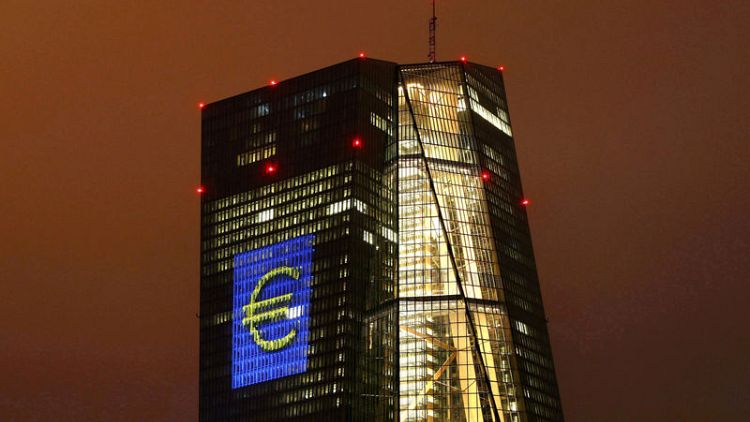By Balazs Koranyi and Francesco Canepa
VILNIUS (Reuters) - The European Central Bank pushed back the timing of its first post-crisis interest rate hike again on Thursday and said it would continue paying banks for lending in its latest effort to revive a slowing euro zone economy.
The moves, which are bolder than analysts had expected until only a few weeks ago, come as a trade war between the United States and China overshadows the global economy and especially export-oriented euro zone countries such as Germany.
Responding to rapidly deteriorating inflation expectations, the ECB pledged to keep its interest rates at their current, record-low level at least through the first half of 2020, instead of the end of this year as it had said only in March.
It will also let banks borrow from the ECB at rate just 10 basis points above its minus 0.4% deposit rate provided they beat the ECB's lending benchmarks in a new targeted longer-term refinancing operation, or TLTRO.
"For banks whose eligible net lending exceeds a benchmark, the rate applied in TLTRO III will be lower and can be as low as the average interest rate on the deposit facility prevailing over the life of the operation plus 10 basis points," the ECB said in a statement.
With pervasive uncertainty already denting trade, big central banks like the ECB and the U.S. Federal Reserve appear to have given up on plans to tighten policy and markets are now positioned for easing.
Attention will now shift to ECB President Mario Draghi's news conference at 1230 GMT.
Draghi is certain to maintain a dovish tone and leave open the possibility of more stimulus.
But the Italian, whose term ends on Oct. 31, cannot afford bigger moves for now as the ECB's policy arsenal is nearly depleted after years of stimulus.
While policymakers say they have plenty of tools left, they have already pushed their main interest rate below zero and bought some 2.6 trillion euros worth of bonds, meaning the scope for more stimulus has shrunk, especially in the case of imported economic weakness.
Economists polled by Reuters expect rates to stay unchanged and expect a first rate hike only in 2021. They also expect the bank's next move to entail policy easing rather than tightening.
RISKS
Draghi's problem is that the global trade war shows no sign of de-escalating, while Italy is once again in conflict with the European Commission, German industry continues to post dismal figures, stock markets are tumbling, and the threat of a hard Brexit looms.
And on top of it all, inflation expectations, the ECB's top worry, are steadily declining, raising the risk that they become dislodged, thereby perpetuating weak price growth.
Philip Lane's first policy meeting as ECB Chief Economist is likely to see the bank's staff cut some of their inflation projections, reinforcing already widespread concerns that price growth is too weak.
The ECB targets an inflation rate of just below 2%, but it has undershot this since 2013 and projections suggest it will continue to miss it for years to come.
The ECB's favoured gauge of market inflation expectations fell to its lowest since 2016 earlier on Thursday while money market pricing showed investors see almost a 70% chance of a 10 basis point cut in ECB rates by the end of the year.
Draghi is also expected to stick to his message that the economy's rebound is merely delayed and not derailed.
But with record-high employment, solid wage rises and several years of unexpectedly good economic growth having failed to boost prices, some may be losing confidence.
"Easy monetary policy will be needed for a long time, and the risks remain clearly tilted to the downside," Nordea economist Jan von Gerich said prior to the rate decision.
(Reporting by Balazs Koranyi and Francesco Canepa; Editing by Catherine Evans)



